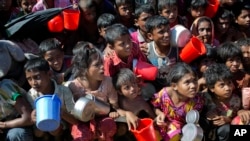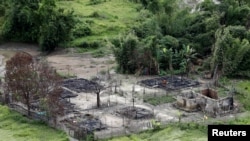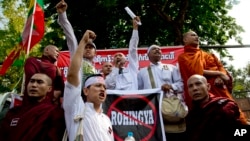Humanitarian organizations are urging the governments of Myanmar and Bangladesh to ensure Rohingya refugees return to their home country in safety and on a voluntary basis. They also say they would boycott any new camps for Rohingya returnees to Rakhine state in Myanmar if the Rohingya refugees are not allowed to safely establish themselves in their existing homes.
In a joint statement issued Friday, groups aids such as Care International, Save the Children, Consortium Dutch NGOs and Solidarites International, say they are “concerned” about the announcement made this past week Bangladesh and Myanmar to “commence returns of refugees” within two months.
Though nonprofits praised the commitment of both countries to facilitate the returning process, they urged that it take place “in line with international standards and we uphold the fundamental right of refugees to voluntarily return to their place of origin. However, we urge that the rights, safety and protection of returnees must be guaranteed before any returns process commences.”
Some 645,000 Rohingya refugees have fled to Cox's Bazar, Bangladesh, since the end of August, the United Nations reports.
Myanmar and Bangladesh signed an agreement in November for the return home of hundreds of thousands of Rohingya who fled to Bangladesh to escape violence in Myanmar's Rakhine state.
Bangladesh officials said returnees initially would live in temporary shelters in Rakhine state.
The announcement raised concerns that refugees would face a repeat of what happened in 2012 when more than 100,000 Rohingya in central Rakhine, who had been trapped in squalid camps, were displaced by a 2012 outbreak of violence.
UNHCR spokesman Adrian Edwards says it is premature to repatriate the refugees, as the conditions for a stable and sustainable return do not exist.
"Many refugees, as you know, have suffered severe violence and trauma," Edwards said. "Many have lost family members, relatives and friends. Many have seen their homes, their villages torched and destroyed. Deep divisions between the communities in Rakhine state remain unaddressed and humanitarian access, at this time, is not there. It is critical that the returns are not rushed or premature.”
"There should be no form of closed camps or camp-like settlements. INGOs will not operate in such camps if they are created," aid groups added on Saturday.
The latest unrest erupted after Rohingya militants attacked police posts in Myanmar on August 25, prompting a military crackdown.
Aid access to northern Rakhine have also been restrained by authorities since the violence erupted in late August, which drove more refugees across the border.
The government in mainly Buddhist Myanmar does not recognize the Rohingya, referring to them as "Bengali" to imply origins in Bangladesh. Officials in Bangladesh say the Rohingya are "Myanmar nationals" and that it is a mistake to refer to them as Bangladeshis.
The aid groups also said they “stand ready” to help those who want to return “when it is safe and sustainable for them to do so.”
“We are committed to helping all groups who have been impacted by the recent violence to recover and rebuild their lives and to support all groups who live in Rakhine State to achieve equality, prosperity and peace,” the statement reads.








